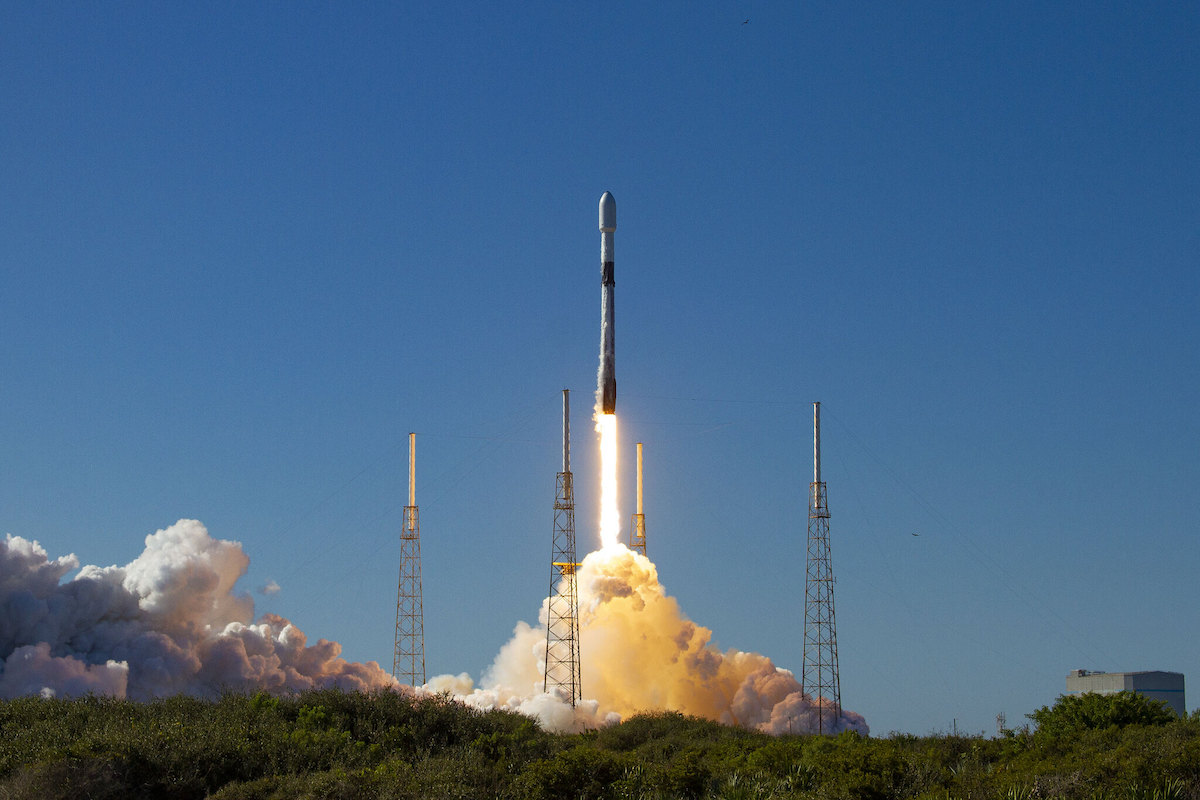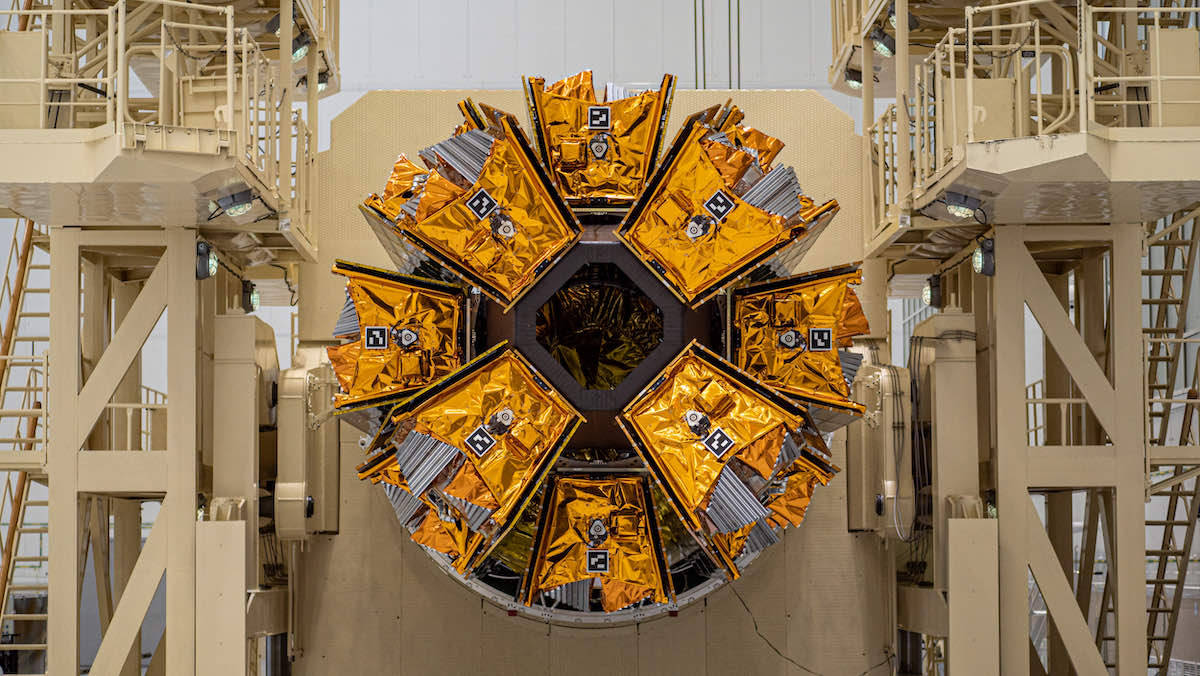
OneWeb said Monday it has reached an agreement with SpaceX to resume launching the company’s satellite internet constellation later this year, just 18 days after suspending launches on Russian Soyuz rockets.
Few details about the agreement were released Monday morning. “Terms of the agreement with SpaceX are confidential,” OneWeb said in a statement.
OneWeb said the “first launch” with SpaceX is expected before the end of this year, suggesting the company anticipates multiple flights on SpaceX rockets.
The company has launched 428 of its planned 648 first-generation broadband satellites on 13 Soyuz rockets, representing two-thirds of its fleet. The missions were booked with Arianespace, the French launch service provider with rights to market and manage commercial Soyuz launches.
Arianespace was on the hook for six more Soyuz launches from the Baikonur Cosmodrome in Kazakhstan.
OneWeb aimed to launch its 14th mission with 36 more satellites March 4 on a Soyuz rocket from Baikonur, but Russia’s space agency, led by Dmitry Rogozin, set conditions on the mission after rolling the rocket to its launch pad March 2.
In the aftermath of Russia’s invasion of Ukraine, and the subsequent Western sanctions, Rogozin demanded OneWeb promise services provided by the internet satellites would not be used for military purposes, and that the UK government give up its stake in OneWeb. The UK government declined, and OneWeb announced March 3 it was suspending launches from Baikonur.
That left OneWeb in a lurch, with 220 more satellites built or under construction at the company’s factory near NASA’s Kennedy Space Center in Florida. Now those satellites won’t need to be shipped to another continent for launch.
“We thank SpaceX for their support, which reflects our shared vision for the boundless potential of space,” said Neil Masterson, OneWeb’s CEO. “With these launch plans in place, we’re on track to finish building out our full fleet of satellites and deliver robust, fast, secure connectivity around the globe.”
OneWeb did not disclose the number of launches it has reserved with SpaceX, or how many OneWeb satellites will fly on each mission. The OneWeb missions with SpaceX will presumably launch on Falcon 9 rockets, but OneWeb did not specify the launch vehicle configuration.
Soyuz rockets typically launched 34 to 36 satellites on each OneWeb mission.
Each OneWeb satellite weighs about 324 pounds (147 kilograms), about half the launch mass of a SpaceX Starlink satellite. SpaceX typically launches around 50 Starlink satellites on each dedicated flight aboard Falcon 9 rockets.
SpaceX could, in theory, launch many more than 36 OneWeb satellites on a single mission. But OneWeb’s satellite deployment dispensers made by RUAG Space are already designed and built, and could be repurposed for SpaceX missions. The dispensers can accommodate a maximum of 36 spacecraft.
The current generation of Starlink satellites — expected to eventually number around 4,400 spacecraft — fly in five orbital “shells” roughly 335 to 350 miles (540 to 550 kilometers) above Earth, with satellites positioned at different orbital inclinations, or angles, to the equator. So far, SpaceX has focused on launching Starlink satellites into mid-inclination orbits at about 53 degrees to the equator.

OneWeb’s satellites fly in polar orbit at higher altitude, roughly 745 miles (1,200 kilometers). The architecture of OneWeb’s network requires fewer satellites than SpaceX’s Starlink fleet. Both companies are eyeing second-generation satellites to add to their constellations.
SpaceX can launch satellites into polar orbit from Cape Canaveral or Vandenberg Space Force Base in California. OneWeb did not identify a launch site for its missions with SpaceX.
After emerging from the bankruptcy process in late 2020, OneWeb was brought under the ownership of the UK government and Bharti Global, an Indian telecom company. Additional fundraising has added other major investors in OneWeb, including the Japanese company SoftBank, the French satellite communications firm Eutelsat, U.S.-based Hughes, and the South Korean business conglomerate Hanwha.
OneWeb, based in London, says it has activated internet service for clients above 50 degrees north latitude. The partial coverage was enabled last year, but the company needs its full fleet to start global service.
The satellite internet network is aimed at reaching remote communities, airplanes, ships, and military users.
OneWeb’s move to SpaceX from Russia’s Soyuz is a shakeup for the commercial space industry. At the time Arianespace signed its launch contract with OneWeb in 2015, it was the largest commercial launch agreement in history, with a financial value of more than $1 billion.
SpaceX is building its own satellite internet constellation, called Starlink. OneWeb and Starlink are geared toward different segments of the telecom market, but their networks are similar, and the only two internet “mega-constellations” well along in their deployment.
OneWeb considered U.S., European, Indian, and Japanese rockets to fill the gap created by the Soyuz rocket embargo. Analysts said SpaceX — with its already high flight rate and inventory of reusable boosters — was likely to be the best bet for OneWeb to get the rest of its satellites up quickly.
“I still think that SpaceX is the fastest route to completing OneWeb’s Gen 1 constellation but … they have their own pressing launch demands with customers,” said Caleb Henry, a senior industry analyst at Quilty Analytics, in an interview earlier this month. “The difference for SpaceX is they have a backlog and storage of their flown boosters, so they don’t have to throttle up production to support OneWeb.”
Email the author.
Follow Stephen Clark on Twitter: @StephenClark1.
from Spaceflight Now https://ift.tt/Bha6045
via World Space Info







0 comments:
Post a Comment